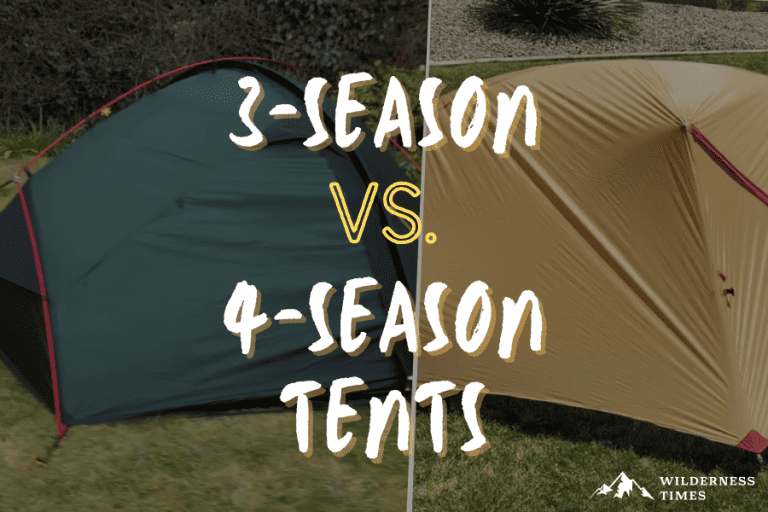Not sure whether you should buy 3-season vs. 4-season tents?
Season ratings can be quite deceiving if you’re not familiar with what they mean.
You might think a 4-season tent is a tent you can use year-round – and while you technically can, these tents aren’t exactly recommended for use in warm weather.
But hang on, how is it a 4-season tent if you can’t use it in the summer? Doesn’t that make it a 3-season tent? Well, no…
A 3-season tent indicates that it isn’t suitable for use in cold weather, while 4-season tents are made for cold and winter-like conditions.
Tents that are made for use in extreme weather conditions are rated as 5-season tents.
Finally, 1- or 2-season tents are designed especially for use in warm weather exclusively.
The easiest way to understand it, I think is visually:
What Is a 3-Season Tent?
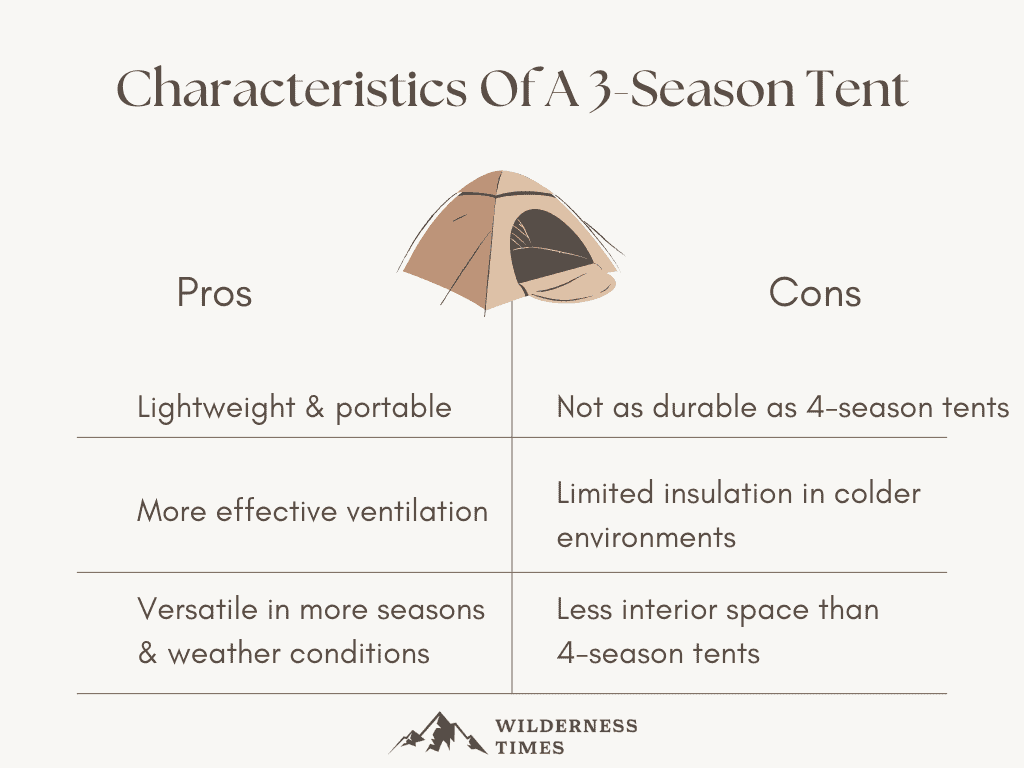
If you’ve seen a tent, it’s most likely been a 3-season tent!
This type of tent is multi-purposeful and can be used in almost any weather or environmental conditions – except extreme cold.
Design & Structure
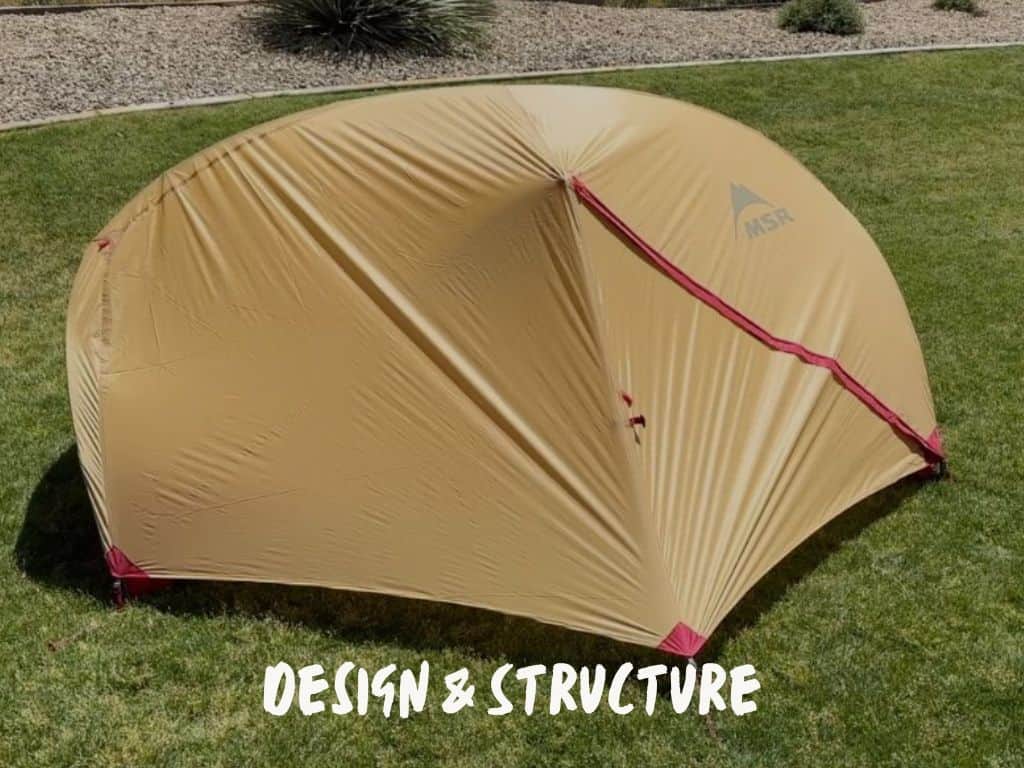 In general, 3-season tents are typically lighter in weight than 4-season tents. This can vary depending on size and model, but it especially holds true for backpacking tents.
In general, 3-season tents are typically lighter in weight than 4-season tents. This can vary depending on size and model, but it especially holds true for backpacking tents.
3-season tents leverage ample mesh panels throughout their structure to ensure ventilation throughout the tent interior.
This quality cuts down on the potential for tent overheating and condensation on the interior of the tent.
In addition, 3-season tents typically have fewer poles and guylines than 4-season tents.
These tents don’t need as many, and it is an advantage if you’re looking to cut down on additional weight in your pack.
Weather Suitability
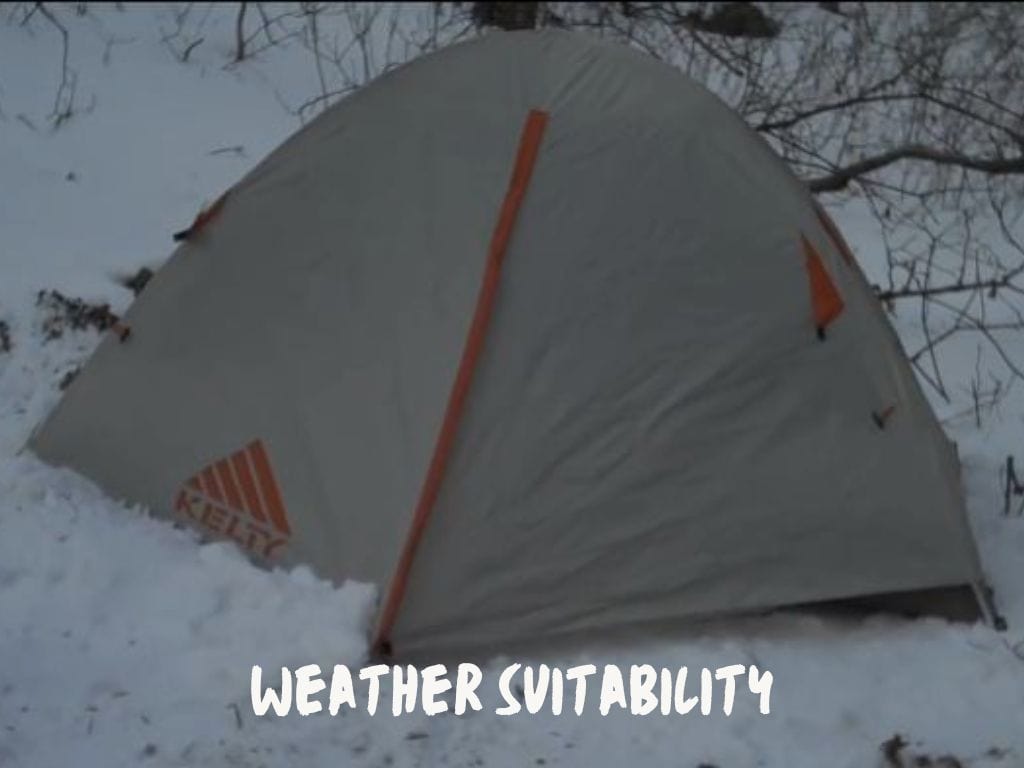
3-season tents are great for camping in moderate conditions throughout spring, summer, and fall. They stand up well to light rain and moderate winds.
These tents aren’t water resistant until the rain fly is attached, though. In the summer, you might not need the rain fly and might find it cooler inside the tent without it.
But in spring and fall, you’ll definitely want to use the rain fly for protection against the elements.
However, 3-season tents will not keep you as warm as may be necessary in cold environments. If you’re headed into any extreme cold conditions, it’s best to bring a 4-season tent.
Advantages
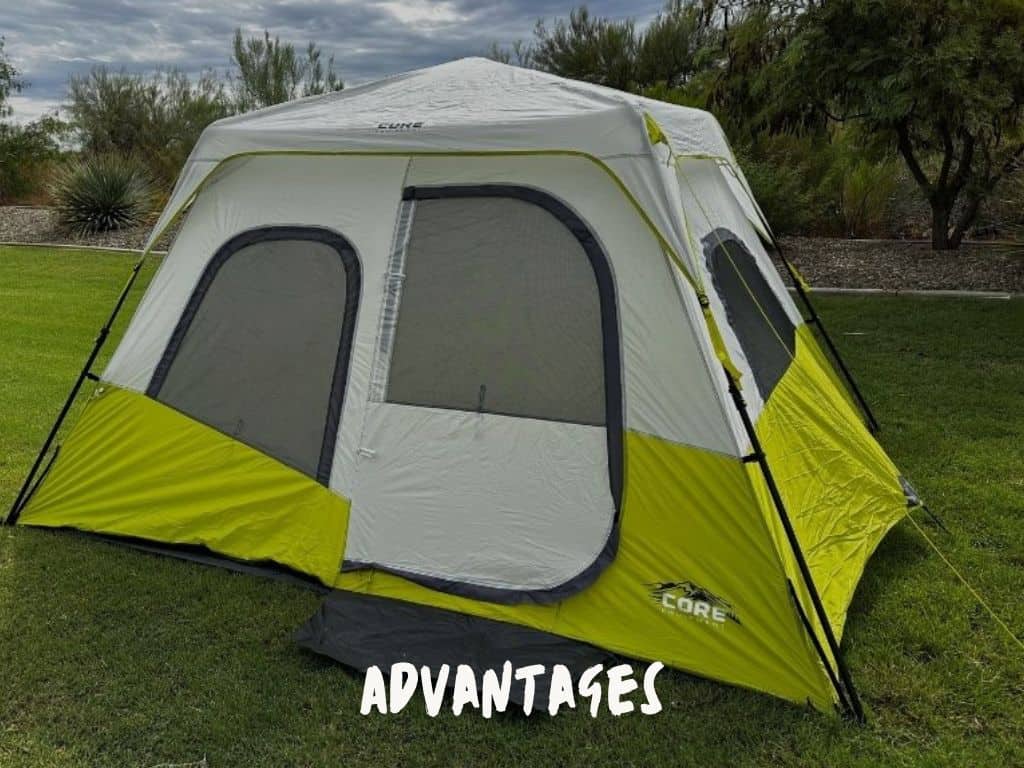
There are many advantages to using a 3-season tent on your next campout!
First, 3-season tents are slightly more user-friendly, as they are more straightforward to set up and easier to transport due to their lighter weights.
Additionally, 3-season tents have better airflow than 4-season tents.
They have more mesh panels in their structure, which allows for better ventilation throughout the tent and less annoying condensation!
In general, 3-season tents are more affordable than 4-season tents. Their design and materials are not as heavy-duty as 4-season tents, resulting in lower overall costs.
Limitations
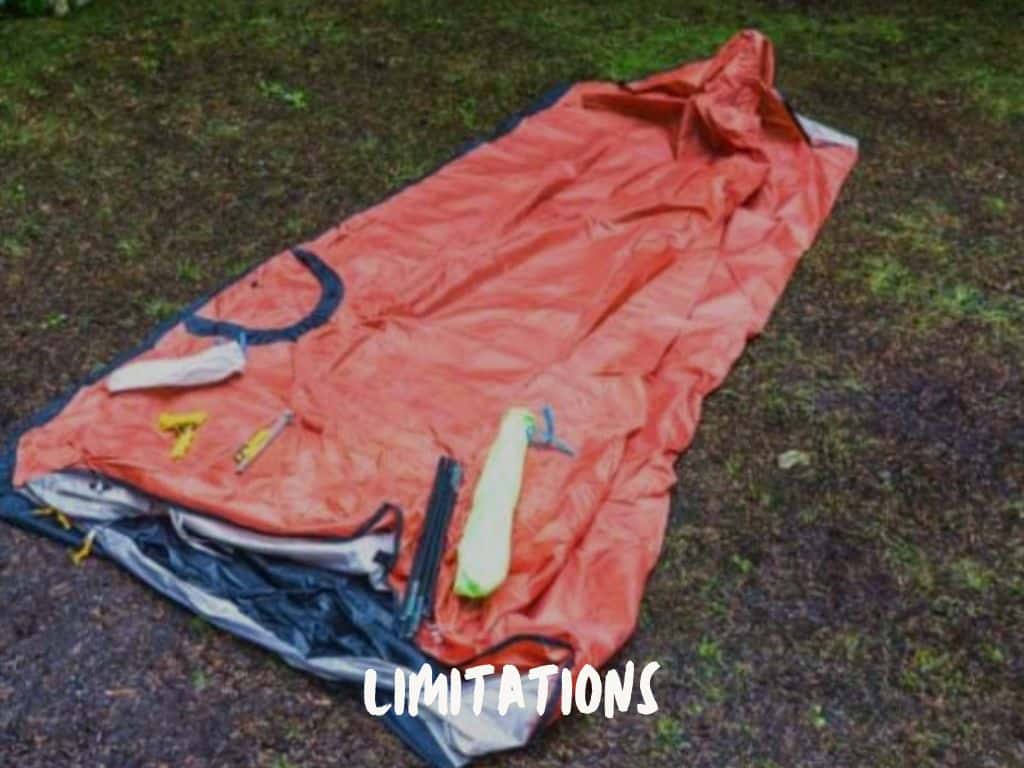
Despite their advantages, 3-season tents are not suitable for heavy snowfall, high winds, or other extreme cold conditions.
This is due to the thinner material used for the tent walls. They don’t provide as good of a barrier as that of a 4-season tent.
Overall, 3-season tents will not keep you as well-insulated and warm as a 4-season tent.
What Is A 4-Season Tent?
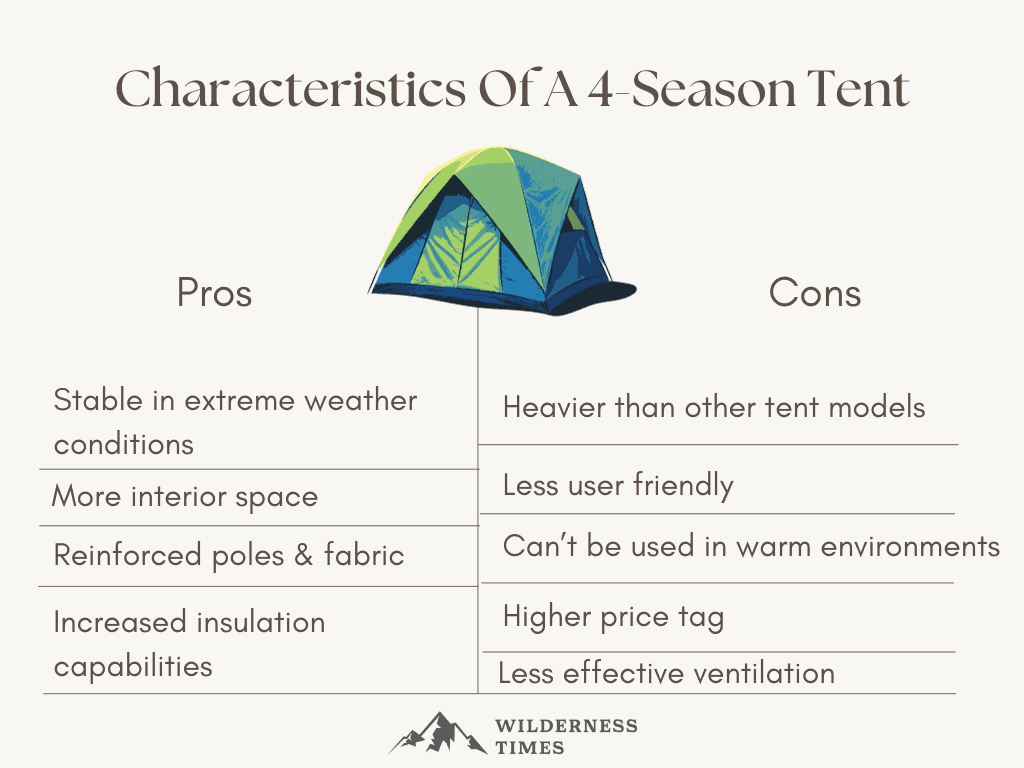
4-season tents are made for a specific type of environment: extreme cold.
Made for mountaineering, high elevation, and inclement snow conditions, these tents have specific features that ensure you’ll be kept warm and protected.
Design & Structure
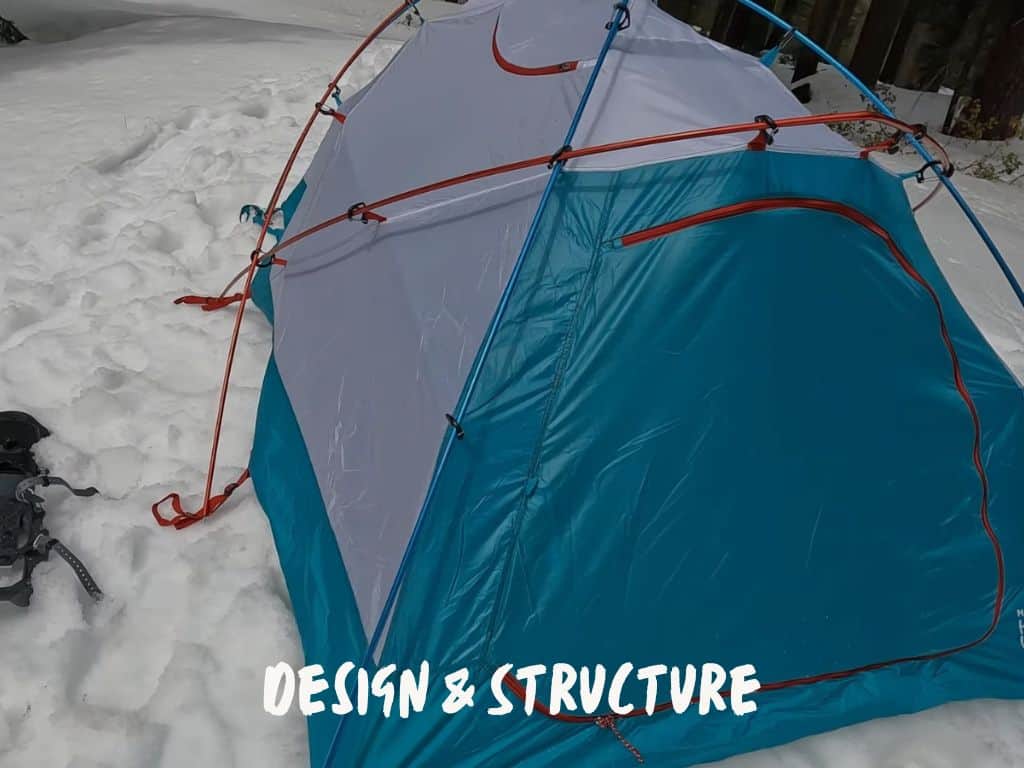
4-season tents are specifically designed to stand up to extreme conditions.
First, the poles and fabric of these tents are thicker and stronger than those of a 3-season tent.
These enhanced qualities make sure that your tent will maintain its structure even in tough conditions.
In order to keep you warm, 4-season tents have less mesh paneling in their overall structure.
This keeps any cold air and breezes out and increases the insulation properties of the tent itself.
Finally, 4-season tents have more poles and guyline points, which you can (and should) use for added stability.
Manufacturers add these additional pieces to ensure that the tent stays firmly on the ground even in high winds and storm conditions.
Weather Suitability
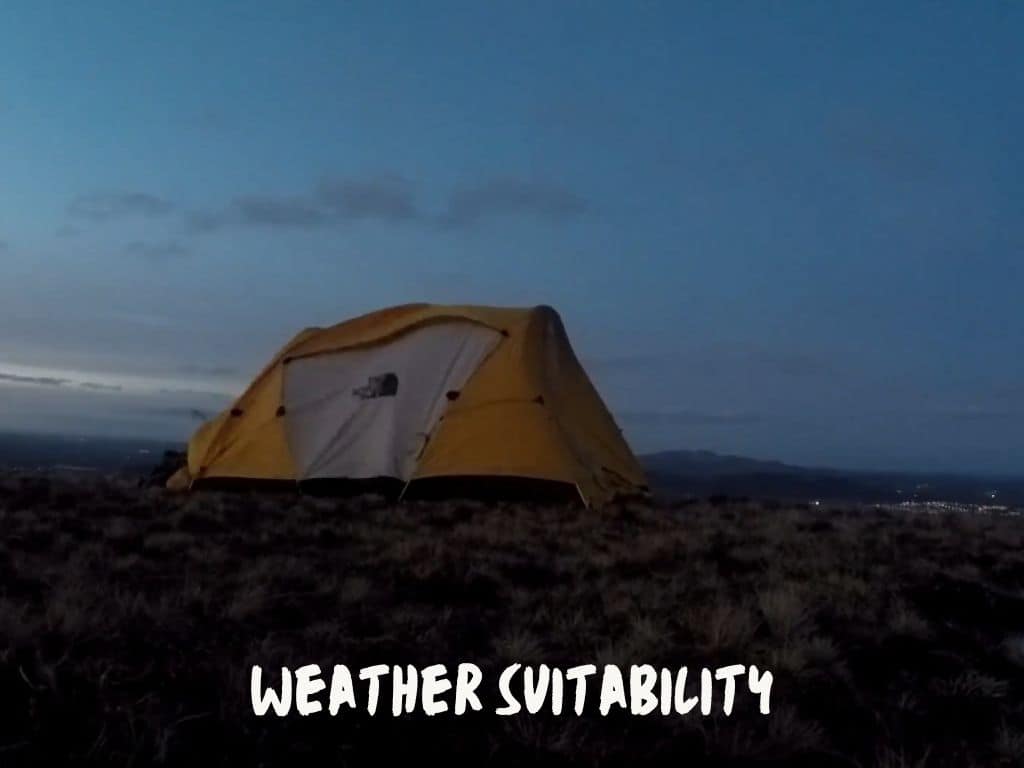
Technically, a 4-season tent can be used year-round, but it really shines in the winter months or in environments with snow, high winds, and extreme cold temperatures.
For this reason, 4-season tents are most used for mountaineering or at higher altitudes.
In general, 4-season tents should not be used in warm weather conditions.
The material thickness and lack of ventilation that help keep you warm in cold environments will overheat you in a warm one.
Read: Single Wall Vs. Double Wall Tent
Advantages
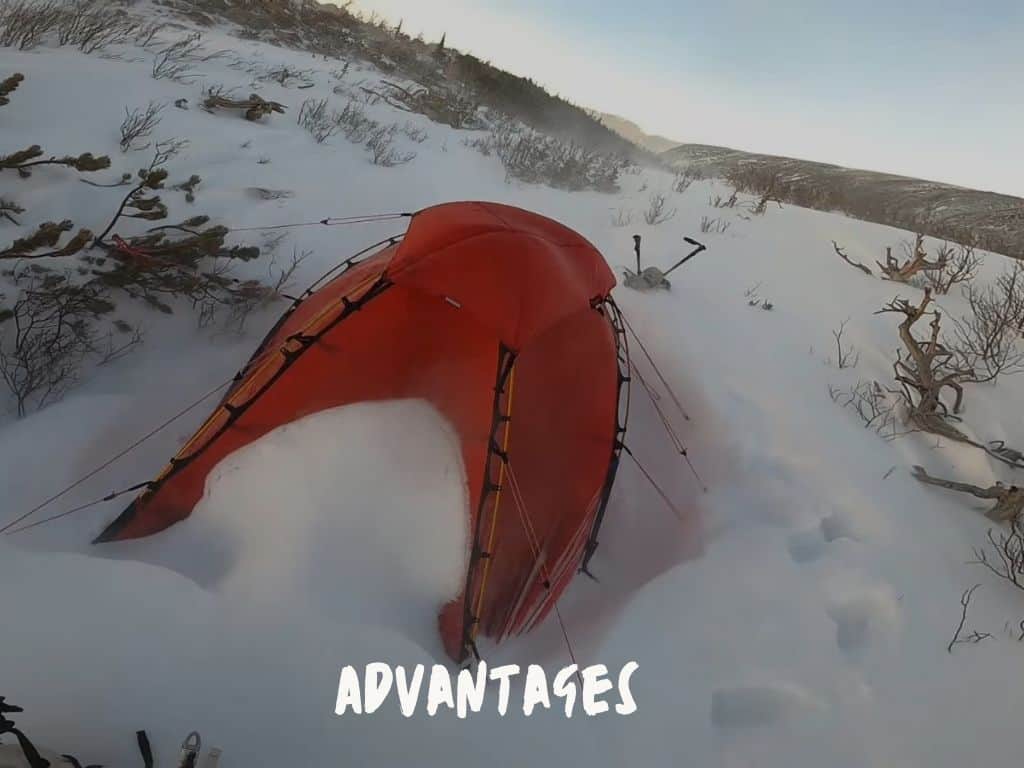
Campers use 4-season tents because they offer the best options for protection against harsh conditions.
If you are headed up to higher elevations, or on a winter camping trip, a 4-season tent should be your go-to.
One of the main advantages is the warmth and insulation that 4-season tents provide. This is due to the thicker materials and lack of mesh in the design.
Even when there is a mesh panel, it is usually reinforced by one made of the regular fabric, meaning the vent can be opened and sealed at the discretion of the campers inside.
Another great feature of a 4-season tent is that they are generally designed to have slightly more room in the interior structure than 3-season tents.
Read: Best Tent Material for Camping
Manufacturers do this so that campers can have more room for the layers they need to stay warm inside the tent.
Finally, 4-season tents are generally more durable than 3-season tents. They have reinforced poles and fabric to help them stand up to extreme weather conditions.
Limitations
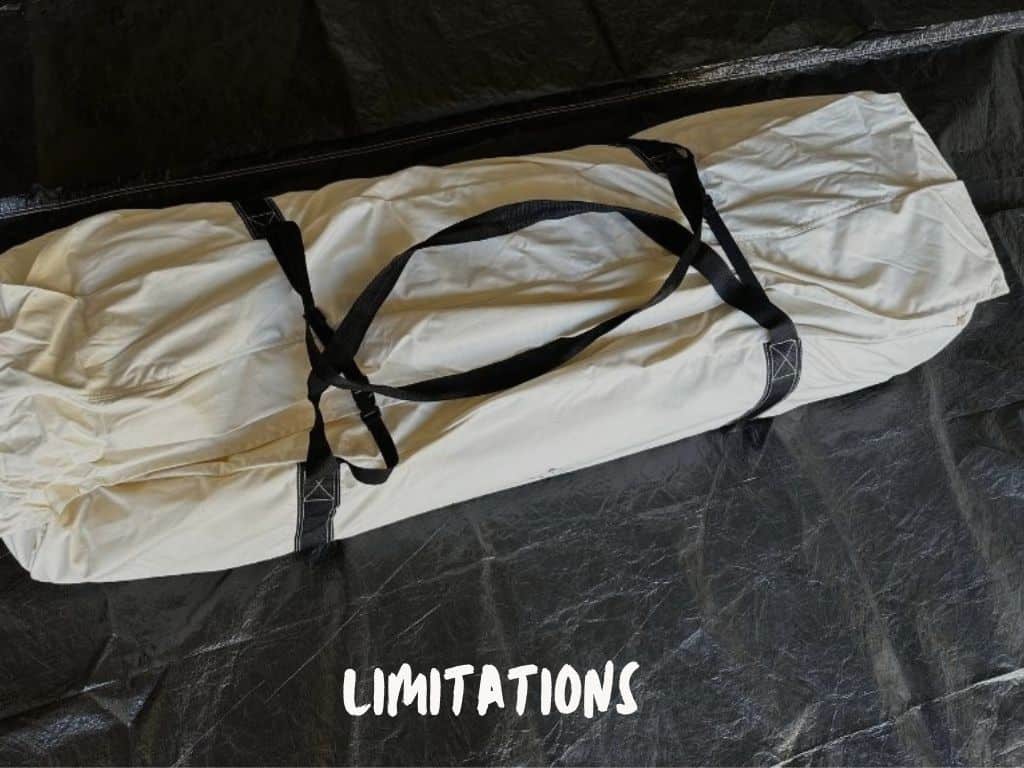
Despite their advantages, there absolutely are limitations when it comes to 4-season tents.
First and foremost, these tents are much heavier to carry than their 3-season counterparts.
This is because of the reinforced materials they’re made of which make them heavier than the average tent.
Additionally, the lack of mesh paneling in the structure of the tent means that the entire structure overall is less ventilated.
This might be helpful in keeping you warm in extreme weather conditions but can also lead to potential condensation issues in warmer weather.
Finally, because of the reinforced materials and enhanced design, 4-season tents are generally pricier than 3-season tents of the same size.
If you’re headed into extreme conditions, this might be a necessary cost.
However, if you’re looking for a more affordable, multi-purpose tent, a 3-season tent might be the way to go.
How To Choose Between 3-Season & 4-Season Tents
| Quality Category | 3-Season Tents | 4-Season Tents |
| Space & Comfort | Average amount of interior space | More interior space for additional layers |
| Quality & Durability | High quality, but not as durable as 4-season tents | High-quality & more durable than 3-season tents |
| Weather Resistance | Built to be resistant to moderate storms and winds | Built to withstand extreme weather conditions like snow storms & high winds |
| Ease of Use | Easier to use & set up than 4-season tents | Slightly more complicated to use & set up than 3-season tents |
| Price & Affordability | More affordable than 4-season tents | More expensive than 3-season tents |
Space & Comfort
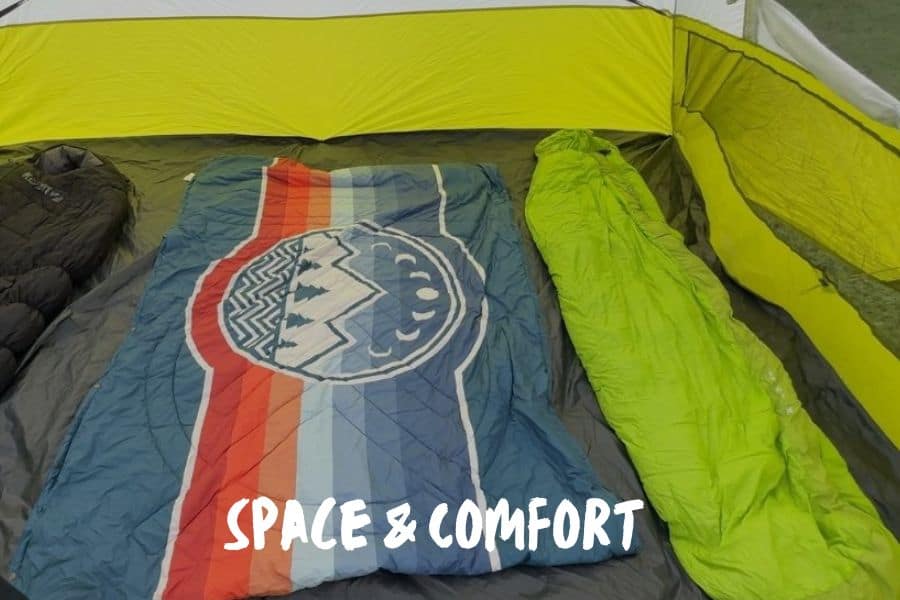
Based fully on numbers and space, 4-season tents will have the most interior space to leave room for the additional layers required when in extreme cold conditions.
However, 3-season tents are by no means lacking in space. Depending on the size you get, you will likely have enough space for you and your gear.
Comfort between the two types of tent will depend on what environment you are camping in.
A 3-season tent will not keep you warm and comfortable in extreme mountaineering conditions.
At the same time, the thick material of a 4-season tent will be too warm in hot conditions.
Quality & Durability
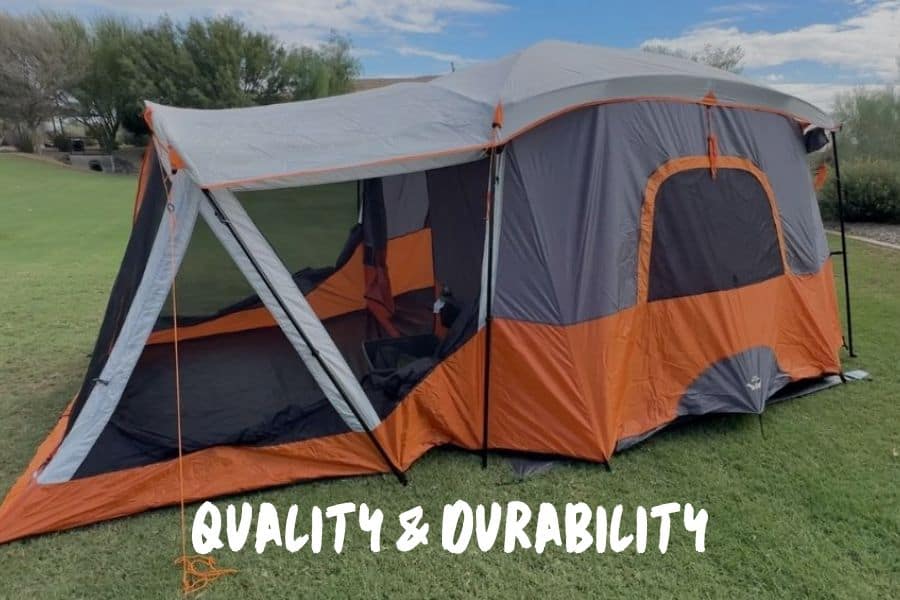
4-season tents have to be more durable than 3-season tents to hold up against extreme cold and weather.
In general, 4-season tents have stronger, less flexible poles, as well as thicker tent fabric.
However, this extreme durability is only specifically necessary in extreme conditions, like mountaineering.
But that is not to say that 3-season tents aren’t durable. They are, just within the more moderate conditions they are created for.
While 4-season tents are more likely to last longer than 3-season tents, 3-season tents are likely to be used more frequently than 4-season tents.
Weather Resistance
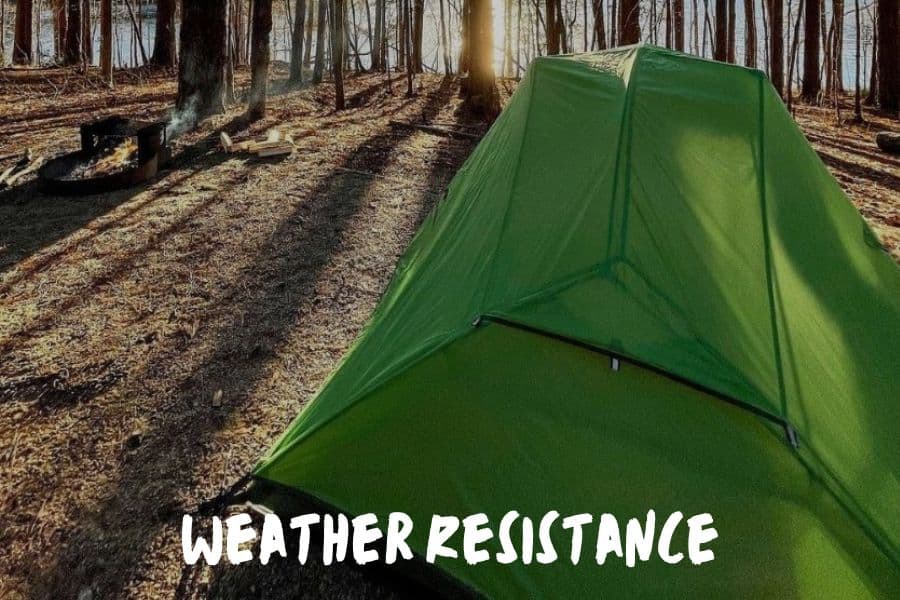
4-season tents were specifically created to withstand extreme weather conditions. Because of this, they will stand up well to harsh cold, snow, and storm conditions.
That being said, 3-season tents are also weather resistant – just not for the extreme conditions we described just above.
Both tents will be sufficiently weather resistant for their given environmental niches.
Ease Of Use
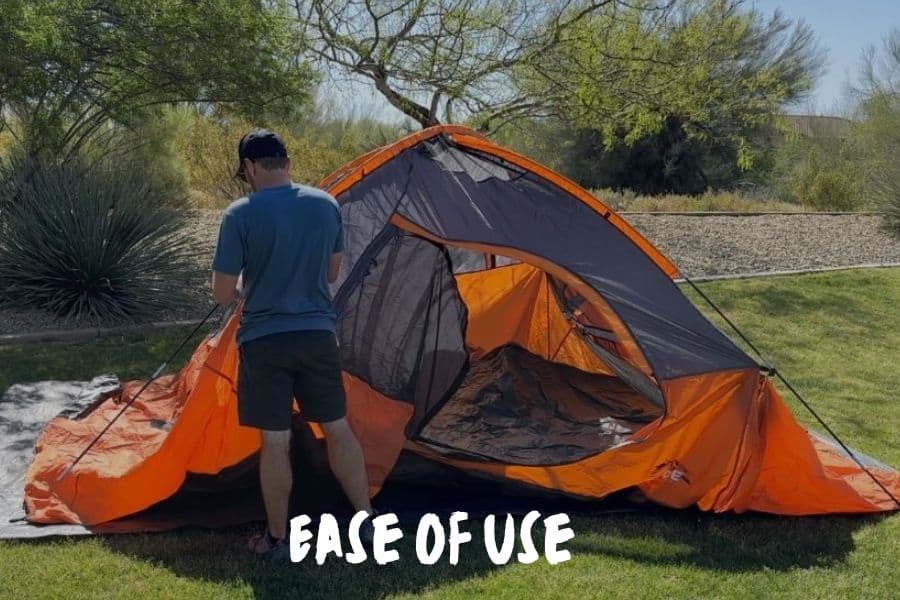
In general, 3-season tents are slightly easier to use. They are the most frequently used and common tent around, so it’s also likely that you’ll be more familiar with them, as well.
This goes a long way in terms of ease of use!
But if you know how to use a 3-season tent, the learning curve for setting up a 4-season tent is not too steep.
Price & Affordability
Because of their reinforced design and materials, 4-season tents are more expensive than 3-season tents.
It cost more to produce the thicker poles and fabric. The fact that 3-season tents don’t need the same level of reinforcement usually results in a much lower price tag.
FAQs
Can I Use A 3-season Tent In Winter?
It depends on the conditions you’re camping in. If the location you’re in has a moderate winter and doesn’t get too cold, you can absolutely use a 3-season tent.
However, if the environment is especially cold, or if you are expecting high winds and snow, a 4-season tent is your best bet.
Is A 4-season Tent Too Hot For Summer Camping?
Yes, the materials are much heavier in 4-season tents than in 3-season tents and they won’t have good enough ventilation for hot weather.
4-season tents are literally built to keep cold out and heat in.
If it is hot outside, it’s going to be even hotter inside.
They will quickly overheat in warm weather and are generally too hot for summer camping.
Why Are 4-season Tents More Expensive?
Making a 4-season tent involves a higher level of material complexity and design techniques, which raises their price tag. It cost more to make thicker, more durable materials.
How Do I Know If My Tent Is 3-Season Or 4-Season?
It will likely be listed on the label! Beyond the label, you can tell by looking at the fabric.
The fabric on a 4-season tent will be much heavier than that of a 3-season tent.
Are There Tents That Are Suitable For All Conditions?
Not really. However, the most versatile tent will be the 3-season tent, since it will serve you well in all other environments other than extreme cold.
And, since the majority of people stick to camping during summer, fall, and spring, most find that a 3-season tent suits them just fine.
The Bottom Line
Now you know all there is to know about 3-season vs. 4-season tents!
At the end of the day, determining which is right for you all comes down to when and where you plan to use your tent.
For most weather conditions, a 3-season tent is what you’re after.
It’s great for use during the summer, but it can also withstand reasonably strong winds, moderate rain, and even light snow.
The only time you’d want to look at getting a 4-season tent is if you’re going to be camping in extreme winter conditions, like if you’re camping at high altitudes during the winter.
We hope you feel confident as you pick the best season rating for yourself and your camping needs.
More on Tents:


